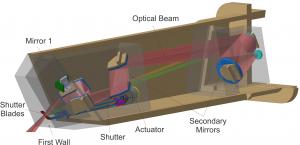Jülich to develop plasma core measuring system
14 Feb 2014
-
Forschungszentrum Juelich
The CXRS diagnostic will help determine the composition and temperature of the plasma. The demanding conditions of the ITER vacuum vessel—temperatures exceeding 100 million degrees Celsius, plasma radiation, neutron flux, and electromagnetic forces—necessitate complex development work and testing.
The German research institute Forschungszentrum Jülich has announced that it will lead a consortium of European partners to design a measuring system for ITER. The consortium has signed a Framework Partnership Agreement with the European Domestic Agency (F4E) to develop the ITER core plasma Charge Exchange Recombination Spectroscopy (CXRS) diagnostic.
This measuring system will help determine the composition and temperature of the plasma in the vacuum vessel. The Framework Partnership Agreement will run for four years with an F4E contribution of EUR 4.9 million.
Once designed by the consortium, the core plasma CXRS system will be procured by F4E and assembled into an ITER vacuum vessel port plug.
The CXRS diagnostic views a region of the ITER plasma illuminated by a high-energy beam of neutral hydrogen particles injected into the plasma by a companion device being constructed by ITER's Indian partners. Collisions with particles in the fusion plasma produce visible light whose wavelength and spatial distribution allow conclusions to be drawn on various properties of the plasma. The measurements provide information that is crucial for sustaining the fusion reaction.
The design of the CXRS diagnostic device is being performed by physicists and engineers from the Jülich Institute of Energy and Climate Research (IEK-4) and by their colleagues at Jülich's Central Institute of Engineering, Electronics and Analytics (ZEA-1) as well as by European partners: Karlsruhe Institute of Technology (KIT); universities of technology in Budapest (BME) and Eindhoven (TU/e); the Dutch Institute for Fundamental Energy Research (DIFFER); and CCFE in the UK. Contributing third parties include the Spanish CIEMAT centre and the Hungarian Wigner-RCP institute.


